|
|
|
Sort Order |
|
|
|
Items / Page
|
|
|
|
|
|
|
| Srl | Item |
| 1 |
ID:
137219
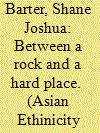

|
|
|
|
|
| Summary/Abstract |
Secessionist movements are often motivated by a sense of exclusion, abuse, and assimilation at the hands of host states. But in waging armed struggles and constructing ethnic nationalisms, they may replicate such grievances against their own minorities. This paper seeks to provide a deeper understanding of how ‘second-order minorities’ respond to secessionist ethno-nationalism. Based on ethnographic research in Aceh, Indonesia, this paper looks to how Javanese, Malay, Alas, and Gayo communities responded to Acehnese secessionism. Aceh’s minorities did not support Aceh’s rebels, opting to flee or resist rebellion. In explaining their reaction, I suggest that the same ethno-nationalist project which united many Acehnese in the secessionist struggle served to repel non-Acehnese communities, leading to ethno-nationalist revivals among Aceh’s minorities and continued tensions in the post-conflict era.
|
|
|
|
|
|
|
|
|
|
|
|
|
|
|
|
| 2 |
ID:
080787
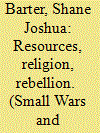

|
|
|
|
|
| Publication |
2008.
|
| Summary/Abstract |
A clear understanding of what creates a conflict is central to building a lasting peace. This paper targets two common misconceptions which cloud analyses of the recent separatist conflict in Aceh. First, the conflict was not about oil. Resource curse theories help explain the creation of the Free Aceh Movement (GAM), but cannot explain why the conflict remained limited for several years. The lessons here are that what motivates a conflict varies over time and across groups. Second, despite Acehnese history, identity, and global trends, the conflict was not marked by Islam. Instead, the GAM promoted ethnic nationalism and downplayed religion to sustain the conflict and their control of it. The lesson here is how leaders can shape, but cannot determine the identity of movements. Beyond these two misconceptions, I move towards explaining the causal mechanisms of the Aceh conflict and assessing this model in light of post-Tsunami developments
|
|
|
|
|
|
|
|
|
|
|
|
|
|
|
|
| 3 |
ID:
137217
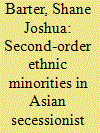

|
|
|
|
|
| Summary/Abstract |
This article provides some conceptual foundations for a special issue of Asian Ethnicity concerned with what we call ‘second-order minorities’. If secessionist conflicts involve minorities resisting abusive, assimilationist states, leading rebel groups to embark on their own nation-building efforts, how does this affect the minorities of aspiring secessionist nations? How do the minorities of secessionist groups respond to secessionism? Despite many insightful studies of secessionism and rebel ethno-nationalism, scholars have yet to explore the ways that local minorities navigate secessionist conflicts. We suggest that the relationship between secessionists and second-order minorities depends on three key factors: whether minorities are territorially concentrated or dispersed, indigenous or migrant, and nation majorities or small national minorities. These characteristics provide us some idea of the types of violence and counter-mobilization we might see among second-order minorities faced with secessionist violence. This article then previews the subsequent studies of Xinjiang, Aceh, Mindanao, and Sri Lanka, cases which capture some of the core challenges faced by second-order minorities against twin violent nation-building efforts from state and rebel forces.
|
|
|
|
|
|
|
|
|
|
|
|
|
|
|
|
| 4 |
ID:
122594


|
|
|
|
|
| Publication |
2013.
|
| Summary/Abstract |
Militias are responsible for some of the most egregious human rights abuses in civil wars. This said, they vary tremendously, and some may serve as a source of security against abusive rebel groups. What distinguishes predatory anti-rebel militias from those which are more or less popular? While previous studies focus on the relationship between militias and states, this study demands equal attention to the militia/rebel relationship. While militias in East Timor were largely predatory, formed at the behest of state forces to attack rebel supporters, militias in Aceh were more diverse, and some formed among ethnic minorities against rebel attacks. This article proposes that militias created where the state dominates are likely to be predatory, while those resisting powerful rebels are more likely to be defensive, popular organizations.
|
|
|
|
|
|
|
|
|
|
|
|
|
|
|
|
| 5 |
ID:
139604
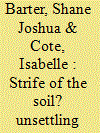

|
|
|
|
|
| Summary/Abstract |
Challenging conventional wisdom, this article argues that Indonesia — long home to both large-scale transmigration programmes and a range of conflicts — has not witnessed transmigrant conflicts. The vast majority of Indonesian transmigrants were resettled in parts of Sumatra which have remained peaceful. In some conflicts, the role of transmigration has been exaggerated. In others, interethnic violence has involved spontaneous migrants rather than state-led transmigrants. We conclude with a discussion of two potential outliers, where violence has been directed towards transmigrants, but only those from disaster-affected regions who arrived en masse. This article argues for a more nuanced understanding of the distinctions between different forms of internal migration, some of which have the potential to spark future violence in recipient areas and communities.
|
|
|
|
|
|
|
|
|
|
|
|
|
|
|
|
| 6 |
ID:
103795
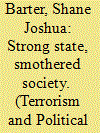

|
|
|
|
|
| Publication |
2011.
|
| Summary/Abstract |
Why have militants in southern Thailand utilized anonymous and at times indiscriminate terrorist violence against civilians? This article gauges three explanations: resource wealth, weak states, and strong states. I argue that terrorist violence against civilians in southern Thailand is partially sustained and largely structured by the considerable institutional strength of the Thai state. This helps sustain the conflict by providing an additional grievance and it structures the form of violence by forcing militants underground and severing their links to civilians. A potential response would be to trim state agencies and scale back the presence of the state in Patani.
|
|
|
|
|
|
|
|
|
|
|
|
|
|
|
|
| 7 |
ID:
102878
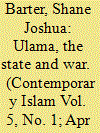

|
|
|
| 8 |
ID:
102933
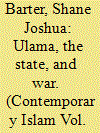

|
|
|
|
|
| Publication |
2011.
|
| Summary/Abstract |
In recent years, much has been said of the relationship between the headmasters of Islamic boarding schools (ulama), the state, and war. Hoping to clarify how ulama behave in times of war and why they react as they do, I look to the recent secessionist conflict in Aceh, Indonesia. Based on extensive village fieldwork, I find that in response to the conflict, Aceh's ulama were divided; some supported the rebels, some supported the state, and some remained neutral. These positions were largely predicted by combatant control, a pragmatic response to conflict dynamics. Sub-regional comparisons, temporal comparisons, and interviews suggest that while many ulama sided with power, they also sided against human rights abuses, a concern for social justice which may be rooted in religious sentiment after all.
|
|
|
|
|
|
|
|
|
|
|
|
|
|
|
|
| 9 |
ID:
144459


|
|
|
|
|
| Summary/Abstract |
How do civilians respond to and shape civil war? Dominant approaches emphasise territorial control, while rival sociological explanations understand civilian behaviour as rooted in justice, pleasure, and social norms. This paper assesses these divergent sensibilities by examining rebel-controlled areas from Aceh, Indonesia. Many civilians provided the rebels with symbolic support, information and provisions, support that deepened over time as the rebels established control. By disaggregating ‘civilians’ into social groups, a more complex story appears. Only some civilian groups supported the dominant armed group, suggesting that control and sociological approaches can be complementary in explaining civilian behaviour.
|
|
|
|
|
|
|
|
|
|
|
|
|
|
|
|
|
|
|
|
|